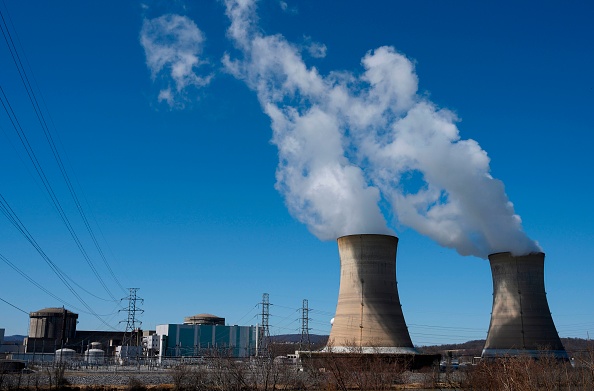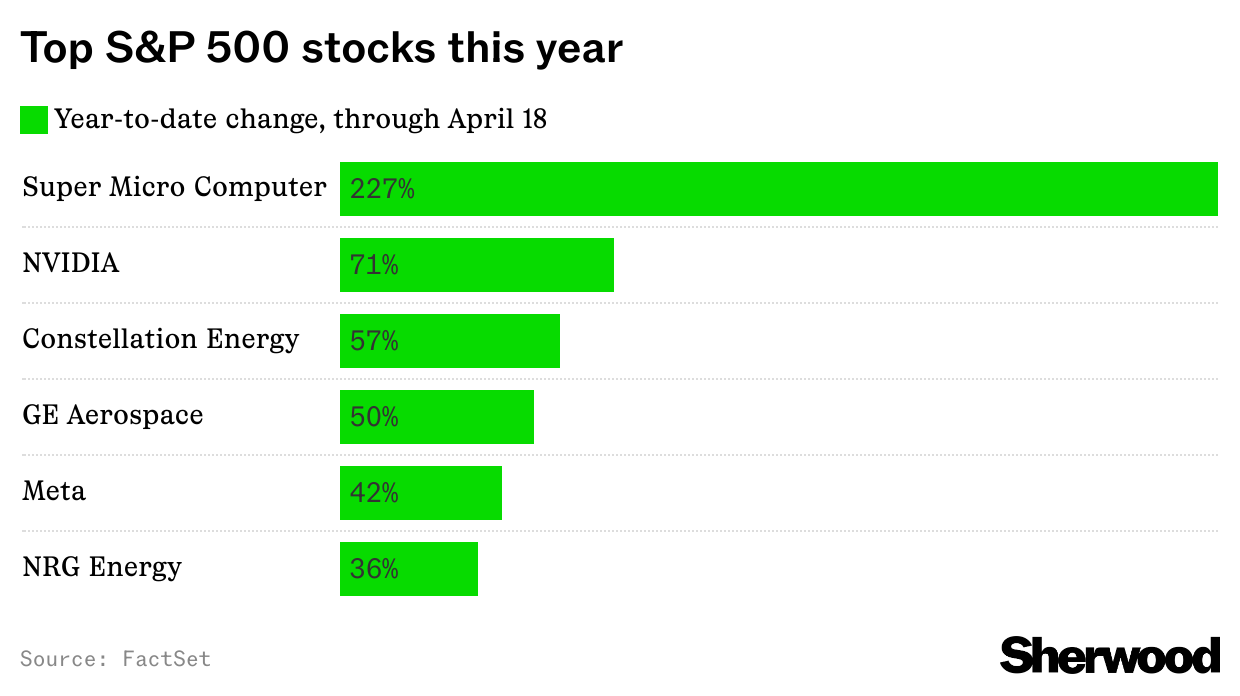Monday Oct.11, 2021
🌳 The Gov v. greenwashing
This storm looks expensive [Rapideye/E+ via Getty Images]
Hey Snackers,
White Vans and green jumpsuits: Possibly the hottest new fashion trend, also Netflix’s “Squid Game” uniform. Vans sales have jumped 7,800% since the show’s debut.
Stocks dipped today, while oil got gassed up: US oil prices climbed 1.5%, breaking $80 a barrel for the first time since 2014. Driving the surge: A global natural-gas shortage has some investors thinking that power plants could switch their fuel from gas to oil.
Scrub
The Green Sheet: The Fed and SEC plant seeds for better corporate climate reporting
Climate-change stress… is getting financial. Risks related to climate change could affect global markets in a big way, and US officials are taking note. Last week, the Fed moved closer to launching climate-risk safety checkups. And the SEC is trying to amp up rules for corporate climate reporting. The disclosures could change company valuations, and how investors view entire industries. The details:
- Climate checkup: The Fed wants to require Big Banks to tally climate risks — aka how much $$ is threatened by intensifying wildfires and floods.
- Climate filings: The SEC wants public companies to share how climate change could affect their business (think: fossil-fueled lawsuits), demand for carbon-heavy products, and what they’re spending to stay compliant.
- Targets: The SEC might also make companies share five-year plans for cutting emissions, plus net-zero goals.
Late to the climate rally… The US is playing catch-up with countries like England and France, which have already set corporate climate-reporting standards. Meanwhile, companies have been making their own rules:
- Neutralize: Tech giants like Amazon and Microsoft made plans to go carbon-neutral. Google says it’s been carbon-neutral since 2007.
- Transition: Oil companies Exxon, Shell, and BP have made multibillion-dollar plans to shift to renewable energy.
- Clean-vest: Investment firms like BlackRock have prioritized renewables to de-risk funds.
Green filter... About 90% of S&P 500 companies share voluntary climate reports. But they’re usually not regulated, and sometimes “greenwashed” to inflate progress:
- Facts: Most Fortune 500 companies have emissions targets, but only 20% are based on science.
- Dally: Amazon committed to carbon neutrality by 2040 in 2019, but its emissions have actually grown 15%+ annually since.
- Lip service: Companies like Costco have said they want to reduce their footprints, but haven’t set formal targets yet.
Goodbye, greenwashing… Because climate accounting is about to be clearer. Standardized climate reporting through the Fed and SEC will likely make it harder for companies to fudge their environmental impact. US officials say better reporting will drive more capital to greener industries, and help countries reach net-zero emissions. Big money is at stake too: Extreme weather has cost the US $1.9T since 1980, and $95B last year alone.
Correction: In the original version of this story published Monday, Oct. 11, we misstated that Netflix had not yet set targets to reduce its carbon footprint. The company has set targets, which you can read about here and here.
Zoom Out
Stories we’re watching...
Leaky roof… Last week the Senate raised the $28T debt ceiling by $480B, preventing a historic and “catastrophic” default, for now. Lawmakers will need to go back to the drawing board to make a long-term plan in December. One solution: The President could order the Treasury to mint a trillion-dollar platinum coin to help offset the nation’s debt. The idea emerged a decade ago but was nixed over inflation worries. TBD if it will happen.
Lifting off... Flights to Cabo still haven’t returned to pre-pandemic levels, but US airline travel is poised to rev up during the holidays. United Airlines said it planned to offer 91% as many domestic flights in December as it did the same month in 2019. Delta said US business traffic is starting to grow, and next year could be its best year since before the pandemic. Flight searches for holiday trips are also up 16% compared to 2019. We’ll see if Delta concerns change airlines’ outlook.
Events
Coming up this week...
Banks’ big week... Citigroup, JPMorgan Chase, Morgan Stanley, and Wells Fargo all report this week. Earlier this year, banks profited from strong consumer spending (thanks, stimmy checks) and by moving billions of “rainy day funds” to reserves. Goldman Sachs and other top IPO underwriters have benefited from a record year for market debuts. Now, investors are watching loan revenue from products like mortgages. Loan growth has been stagnant, and makes up more than half of the banking industry’s revenue.
Dough-eyed… America’s biggest pizza chain saw sales skyrocket during lockdown when more people munched from their couch. Domino’s sales growth has slowed down this year, but the chain is still growing sales in places where Covid restrictions are lifting. Small price hikes for delivery fees and menu items have helped. When Domino’s reports on Thursday, we’ll see whether the labor shortage impacts results (the chain hires its own delivery drivers), and if the pizza fever is still going strong as more cities reopen.
ICYMI
Last week's highlights...
- Global: Netflix’s South Korean hit “Squid Game” didn’t become the top TV show in 90 countries by accident — it’s part of the ’Flix’s strategy to go global.
- Levi’s: The denim icon's sales blew past pre-pandemic levels last quarter thanks to “casualization” (think: baggy), plus a sturdy supply chain behind the seams.
- Robotaxi: GM isn’t only doubling down on EVs to catch up to Tesla —– it’s launching a robotaxi fleet in a push to zoom past it.
What else we’re Snackin’
- Breakthrough: A new “pacemaker for the brain” could help treat severe depression. Magnet to download brain activity included.
- Pivot: Burnout and Zoom fatigue: Why some millennials are quitting their jobs without a plan B.
- Mine: See all the metals we pull out of the Earth each year in one picture. Spoiler: There’s tons of iron.
This Week
- Monday: Indigenous Peoples’ Day
- Tuesday: Earnings expected from Fastenal
- Wednesday: September Consumer Price Index. Earnings expected from JPMorgan Chase, Bank of America, Wells Fargo, BlackRock, Infosys, Progressive, and Delta
- Thursday: Weekly jobless claims. Earnings expected from UnitedHealth, Morgan Stanley, Citigroup, US Bancorp, Walgreens, Domino’s, and Del Taco
- Friday: September retail sales. Earnings expected from Goldman Sachs, JB Hunt, Prologis, and PNC
Authors of this Snacks own shares of: Google, Netflix
ID: 1869667
.png)

